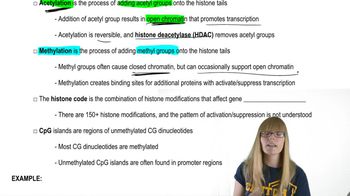Here are the essential concepts you must grasp in order to answer the question correctly.
Epigenetics
Epigenetics refers to the study of heritable changes in gene expression that do not involve alterations to the underlying DNA sequence. These changes can be influenced by various factors, including environmental stimuli, lifestyle, and developmental stages. In cancer, epigenetic modifications can lead to the activation of oncogenes or the silencing of tumor suppressor genes, contributing to tumorigenesis.
Recommended video:
DNA Methylation
DNA methylation is a key epigenetic mechanism that involves the addition of a methyl group to the DNA molecule, typically at cytosine bases. This modification can repress gene expression and is often found in cancer cells, where abnormal methylation patterns can silence genes that normally prevent tumor growth. Understanding these patterns is crucial for identifying potential biomarkers and therapeutic targets in cancer treatment.
Recommended video:
Histone Modification
Histone modification involves the chemical alteration of histone proteins around which DNA is wrapped, influencing chromatin structure and gene accessibility. Common modifications include acetylation, methylation, and phosphorylation, which can either promote or inhibit gene expression. In cancer, abnormal histone modifications can lead to the dysregulation of genes involved in cell cycle control and apoptosis, thereby supporting cancer cell survival and proliferation.
Recommended video:
Histone Protein Modifications
 Verified step by step guidance
Verified step by step guidance Verified video answer for a similar problem:
Verified video answer for a similar problem:

